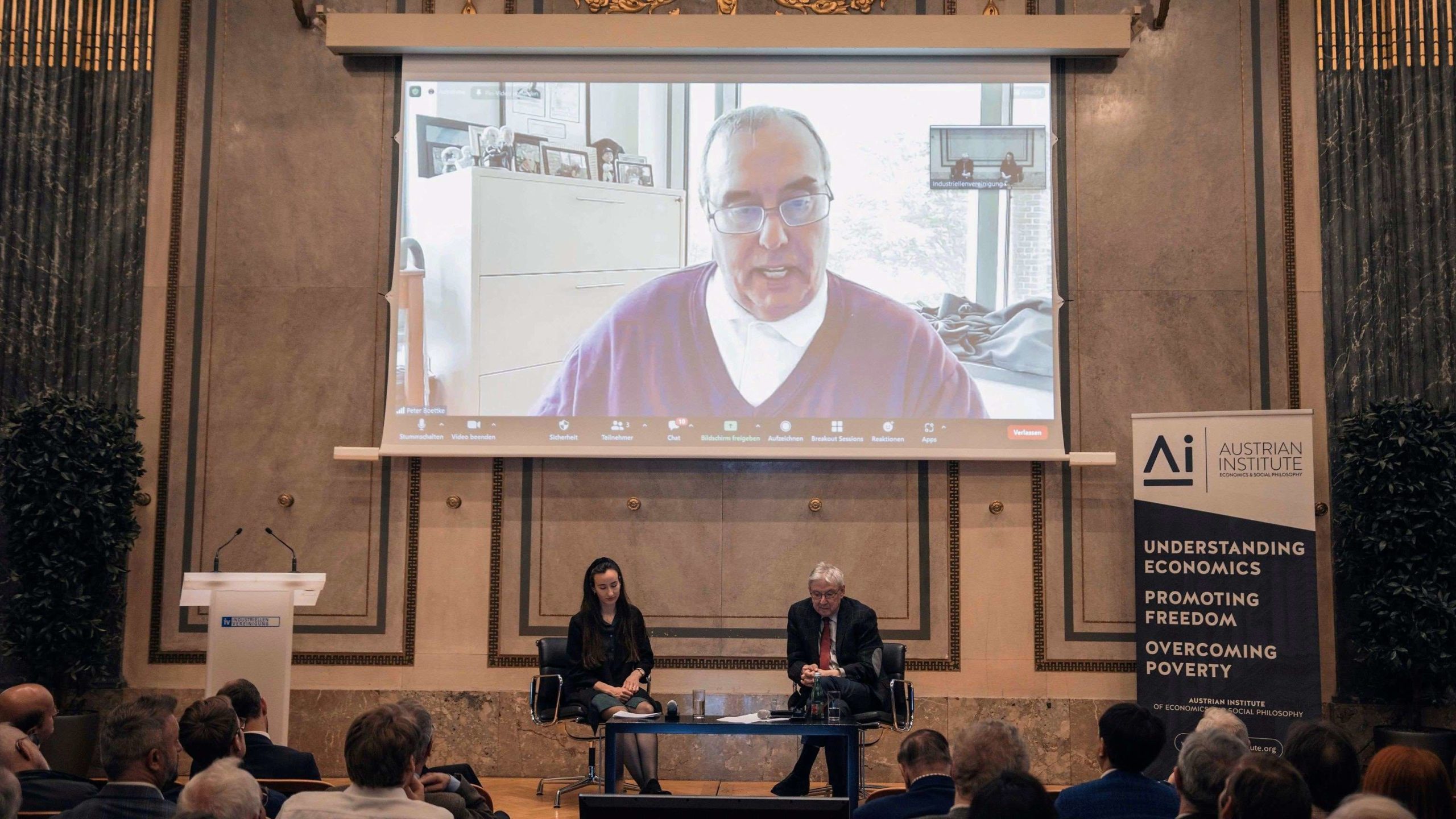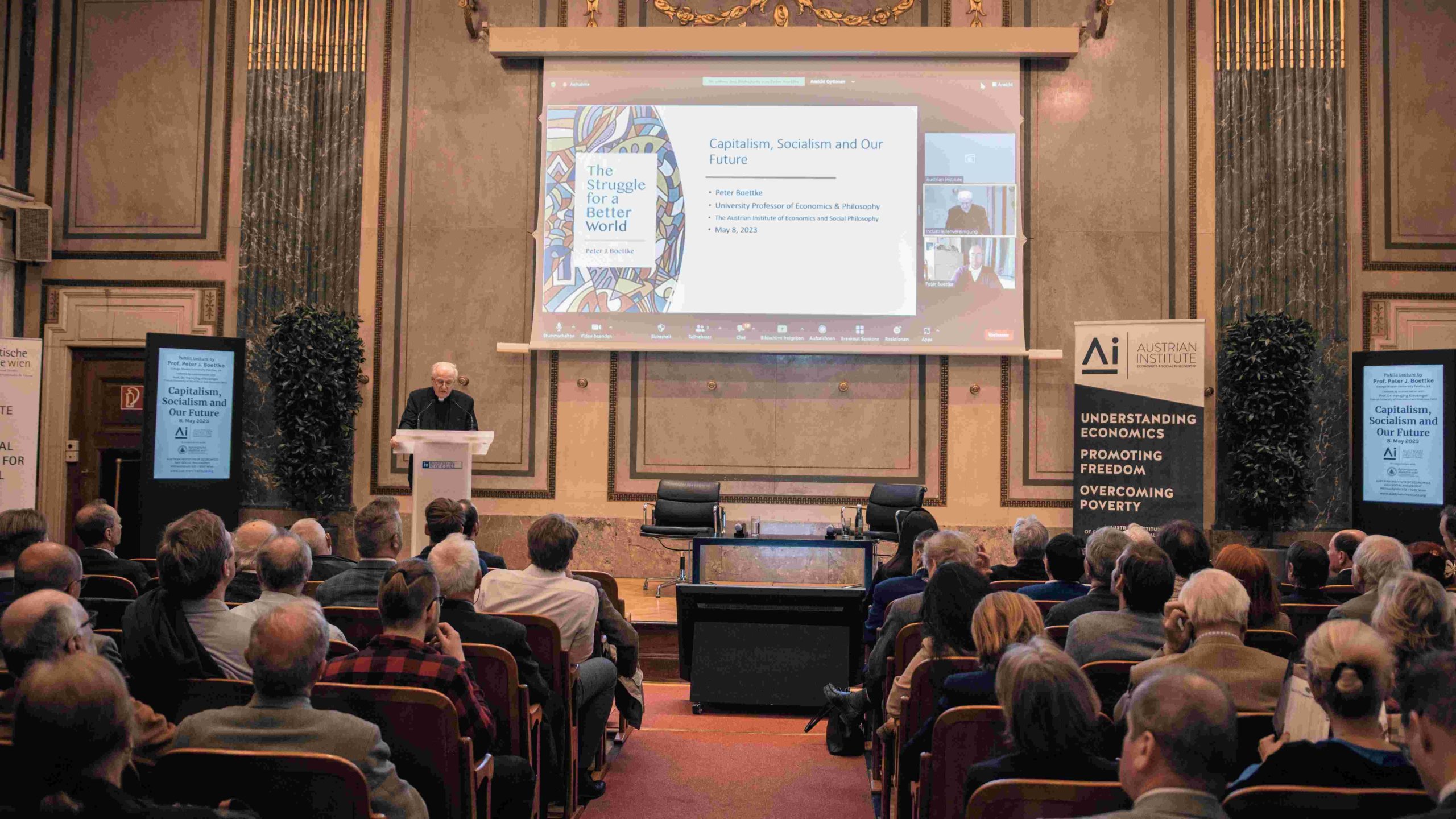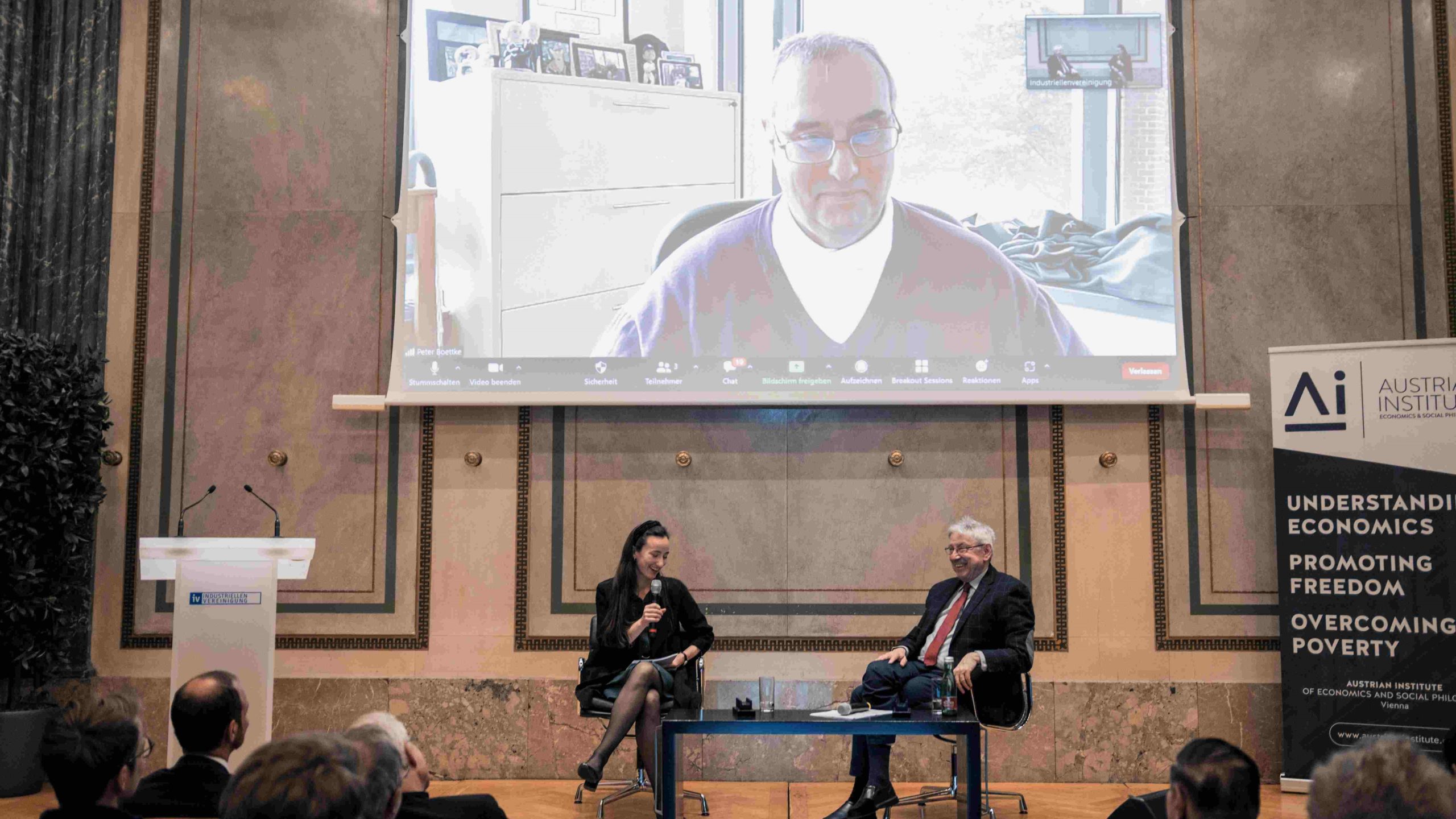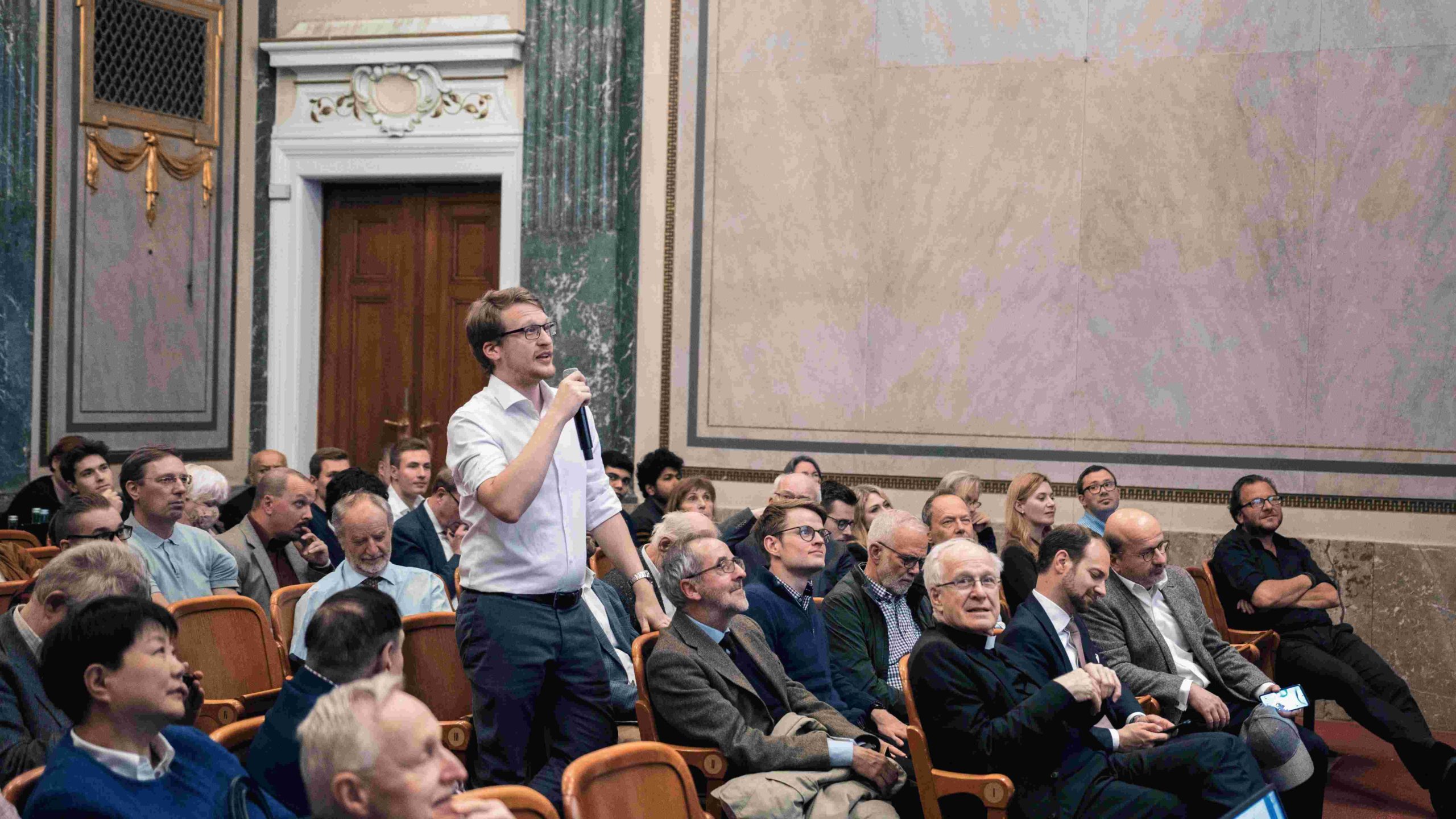 Peter Boettke konnte aus gesundheitlichen Gründen nicht nach Wien reisen und hielt deshalb seinen Vortrag über Zoom. Trotz dieser Einschränlung waren über 100 Personen im Kleinen Festsaal im Haus der Industrie präsent. (Foto: Austrian Institute / Johannes Rauscher)
Peter Boettke konnte aus gesundheitlichen Gründen nicht nach Wien reisen und hielt deshalb seinen Vortrag über Zoom. Trotz dieser Einschränlung waren über 100 Personen im Kleinen Festsaal im Haus der Industrie präsent. (Foto: Austrian Institute / Johannes Rauscher) Free market economy or planned economy, liberalism or socialism—this has always been the key question for our civilization, Prof. Dr. Peter J. Boettke—University Professor of Economics and Philosophy at George Mason University—emphasized at a lecture in Vienna. Just a few decades ago, as a result of the collapse of the Soviet Union, capitalism seemed certain to be the winner.
Thirty-four years later, that is anything but certain. Once again, Boettke says, we find ourselves at a crossroads. Crises in politics and the economy, accompanied by a growing loss of confidence in central institutions, are currently creating pressure for reform. However, it is more uncertain than ever which direction we will take. This is because anti-capitalist and planned economy thinking is experiencing a revival—think of Millennial Socialism, Generation Bernie Sanders, and the eco-socialist trends.
On May 8, 2023, the Austrian Institute in cooperation with the Diplomatische Akademie Wien – Vienna School of International Studies invited to a public lecture of Prof. Peter J. Boettke at the Haus der Industrie. Only a short time before the date we learned that Prof. Boettke had to cancel his planned trip to Vienna for health reasons. Thanks to the support of the technology at the venue, the lecture that included a discussion with Prof. Dr. Hansjörg Klausinger from the Vienna University of Economics and Business (WU) could be held as a face-to-face event followed by a buffet. The main speaker was connected via video conference on the big screen. The entire event is available on video recording.
Boettke’s central thesis is that economic science has the answer to the current crises, and it points the right way to the future, which can only be an economically liberal one. The emergence of modern economic science and the origin of liberalism are inseparably linked. Indeed, both developed hand in hand. Boettke shares this conviction with the Austrian economist Ludwig von Mises, who wrote in his work Liberalism, “Liberalism cannot be understood without economics. For liberalism is applied economics, it is state and social policy on a scientific basis.”
This was also the core topic of the lecture “Capitalism, Socialism and our Future,” which Boettke gave on May 8 at the invitation of the Austrian Institute in the Haus der Industrie. Prof. Peter J. Boettke, who is also director of the F. A. Hayek Program for Advanced Studies at George Mason University, and who served as president of the Mont Pelerin Society from 2016 to 2018. He based his reflections on Mises, Friedrich August von Hayek, Adam Smith, public choice theory, and other notable contemporary liberal thinkers.

Liberalism and Free Market Economy Increased Prosperity—Always and Everywhere
The Industrial Revolution and liberalism brought unprecedented growth in prosperity to mankind. Impressive graphics and data from all over the world illustrate this. They can be found, among other places, on the well-known website Our World in Data, to which Boettke referred at the beginning of his talk. The data prove: Prosperity growth—illustrated by an enormous increase in GDP—has, as Boettke noted, “nothing to do with the people or with the geography of where they reside, it has to do with the rules of the social game.” Wherever liberal frameworks became established, whether first in Europe and the United States, or later in Asia, prosperity has grown on a historically unprecedented scale.
At present, however, discontent is spreading in the West. Inequality due to a lack of social mobility, instability as a result of the financial crisis, and injustice due to police brutality have brought many people to the streets in the United States. Many see capitalism, of all things, as the problem, not the solution. U.S. Senator Bernie Sanders even declares in his book of the same name: It’s Okay to Be Angry at Capitalism.
Boettke blames a number of undesirable developments for the considerable problems and challenges of the present, but these can hardly be blamed on the free market economy. In Vienna, for example, he mentioned the “monetary mischief” of central banks, referring to the Federal Reserve’s balance sheet as a result of its ultra-loose monetary policy. He sees another problem in the “fiscal irresponsibility” of post-1945 politics, because of which intergenerational equity has now become uncertain: Are we able to provide for the future generation? asks Boettke. Another difficulty, he said, is the “pathology of privilege.” Distortions in the system, he said, have led to a U.S. economy based on relationships, rather than contracts.
Economics Must Not Lose Sight of the Framework Conditions of a Free Market Economy
Economics has the right approaches to solving all these problems, Boettke said. However, they have also been forgotten by quite a few economists. Thus, economics should return to its roots. Following Adam Smith, national economics and liberalism went hand in hand until the beginning of the 20th century. The economists of the time, Boettke emphasizes, knew about the importance of the legal framework for the functioning of a free market economy. However, this crucial aspect was later increasingly lost from view and must now be regained.
A free-market economy is based on property, contract, and mutual consent. It needs appropriate legal framework conditions for this, and these did not fall from the sky. This is of high importance and needs to be examined, Boettke explained, because you can’t take institutions for granted, but you must use the tools of economic thinking to study how they came about. Only when the framework conditions are right can economic processes and exchange relationships unfold.
The institutional conditions and important economic categories did not come out of nowhere. They are not self-evident, even if they are taken for granted today. A liberal attitude was crucial to their emergence. Boettke quoted the famous U.S. economist Deirdre McCloskey, who states in her book Bourgeois Dignity: Why Economics Can’t Explain the Modern World: “Liberal ‘rhetoric’ explains many of the good features of the modern world compared with earlier illiberal regimes—the economic success of the modern world, its splendid arts and sciences, its kindness, its tolerance, its inclusiveness, its cosmopolitanism, and especially its massive liberation of more and more people from violent hierarchies, ancient and modern.”
Since the Beginning, Modern Economics Has Not Been Blind to Social Issues, Far from It
But can economics provide answers to burning social problems and political issues, such as hardship, ignorance, disease, misery and unemployment? “It’s not the case that economists were blind to these social ills,” Peter J. Boettke emphasized, referring to Adam Smith, the father of modern economics. His research into important economic laws was always accompanied by his fight against mercantilism, and to overcome misery.
Boettke shows that Smith was concerned with increasing “the welfare of the least advantaged” by referring to a famous passage in The Wealth of Nations. In chapter eight of the first book on labor wages, the British thinker states, “Is this improvement in the circumstances of the lower ranks of the people to be regarded as an advantage, or as an inconveniency, to the society? The answer seems at first abundantly plain. Servants, labourers, and workmen of different kinds, make up the far greater part of every great political society. But what improves the circumstances of the greater part, can never be regarded as any inconveniency to the whole.”

Two central sentences follow, which also reflect Smith’s ideas of justice: “No society can surely be flourishing and happy, of which the far greater part of the members are poor and miserable. It is but equity, besides, that they who feed, clothe, and lodge the whole body of the people, should have such a share of the produce of their own labour as to be themselves tolerably well fed, clothed, and lodged.”
Peter J. Boettke never tires of emphasizing: The systematic economic science that Adam Smith founded was at the same time a critique of the privileges of the time. Economic liberalism and political liberalism both sought together to remove arbitrary barriers created by the powerful and privileged. Their goal was the rise of commercial society and the liberation of humanity from poverty and subjection to uncontrolled authority. Adam Smith pursued a plan for liberty, equality and justice.
It Is about the Most Effective Way to Overcome Misery
Economic science was also concerned with achieving a free and prosperous society, seeking the “most effective way to minimize human suffering and maximize human flourishing,” Boettke said. Its study was done in the light of the constraints of nature and the scarcity of resources, as well as with an eye toward “coordinating distant and disparate individuals” for the purpose of “assuring the cooperation among multitudes of strangers” that enables “mutually beneficial exchange.”
What economics has also demonstrated: Socialism cannot be the answer to social need because it does not and can never work. Ludwig von Mises demonstrated the impossibility of economic calculation, as well as the destruction of the price formation process and the inadequate organization of production under socialism. A socialist ruler—even if he should have the best intentions—will be overwhelmed to pick out from the crowd of technically feasible projects those which are economically viable.
The problem of concentration of power and harmony between peoples under socialism has also been worked out by economics, including by Friedrich August von Hayek in his work The Road to Serfdom.
In conclusion, economics in the liberal tradition would be the right advisor for the present. It would be needed above all for a critique of institutions and necessary institutional reforms. A reflection on and re-reading of Adam Smith would be very helpful. Mises, Hayek and James M. Buchanan would also be important sources of inspiration.
How to Communicate Market Economy and Liberalism
Boettke’s lecture culminated in practical questions. For the decisive impulses of classical economic thought and liberalism must not only be understood, but also communicated and passed on so that they bear fruit anew, as they did in the past. This would have to happen in schools and universities, for example. “You have to meet students where they are,” Boettke said, by appealing to their compassion and pointing out that it’s about improving the welfare of the least advantaged and eliminating privilege through the power of the market.
One might also address the hopes of young people to inspire them to learn economics. After all, the free-market economy has a remarkable track record. Improving the rules of social interaction allows individuals “to pursue productive specialization.” Moreover, it achieves “peaceful social cooperation through exchange.”
A Mixed Outlook, Not Only Encouraging but Ultimately Optimistic
In the lively discussion that followed, Boettke first had a conversation with Prof. Dr. Hansjörg Klausinger (Vienna University of Economics and Business), the internationally known Hayek specialist and editor of two volumes of his Collected Writings. Klausinger is also co-author (together with Bruce Caldwell) of the new, two-volume biography of Friedrich A. von Hayek, Hayek: A Life, the first volume of which has been published by the University of Chicago Press in December of 2022 (volume 2 is in preparation).
“What we have in the world today is not necessarily the rule of law, but instead a lot of…rules,” Boettke noted about the current political-social situation in many Western countries. One could also learn from the example of U.S. economist Milton Friedman, he said, who was an outstanding communicator and had a major influence on public discourse in the U.S. in the second half of the 20th century.

The ensuing debate also led into scientific realms. Klausinger’s partially critical inquiries—for example, with regard to the logic of collective action possibly undermining Boettke’s liberal approach—were finally answered by Boettke with the recommendation of a combination of Buchanan and Hayek. The two thinkers would complement each other well. Ultimately, however, it is not only theoretical knowledge that helps: “We don’t need think tanks, we need “do-thanks.”
Boettke’s outlook was neither optimistic nor pessimistic, which is in keeping with the final chapter of his latest book, The Struggle for a Better World, a book that consists of several essays and lectures. There, Boettke describes himself as pessimistically optimistic. He explains that he believes that the “ultimate resource is the human imagination,” and that the great diversity of human ingenuity and creativity will help us find a way out of the innumerable difficulties we have caused and will cause ourselves.
But he is pessimistically optimistic because the prevailing models of thinking that humans employ to make sense of their interactions with each other and with nature are so fundamentally flawed and based on zero-sum and negative-sum intuitions. We systematically underestimate the costs, he says, by blocking trade opportunities among ourselves and curtailing the creative powers of entrepreneurship, and we systematically overestimate the benefits of trying to curb the excesses of self-interest through collective action by state power.
Boettke sees the main problem as moral intuitions hard-wired into people’s minds by our evolutionary past in small groups and the tyranny of state controls in people’s affairs. In the final analysis, however, he remains an optimist because of the “creativity of the individual agents” and the power of the market.
Translation from German by Thomas and Kira Howes
Photo gallery
After the lecture, the Austrian Institute hosted a buffet, sponsored by the bank Schelhammer Capital. Thanks also go to the Federation of Austrian Industries (IV) for its support and for making the hybrid format, which was not initially envisaged, technically possible.
Below are some atmospheric pictures of the event.



